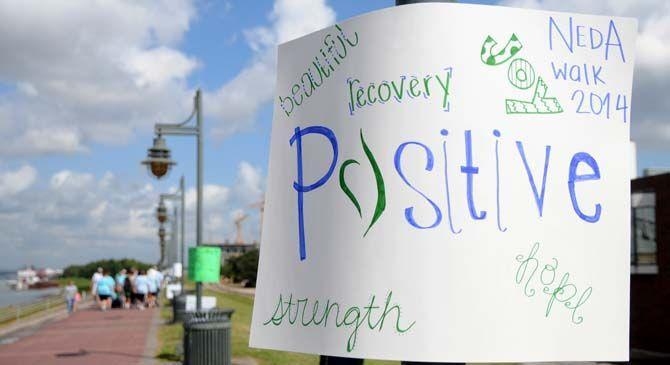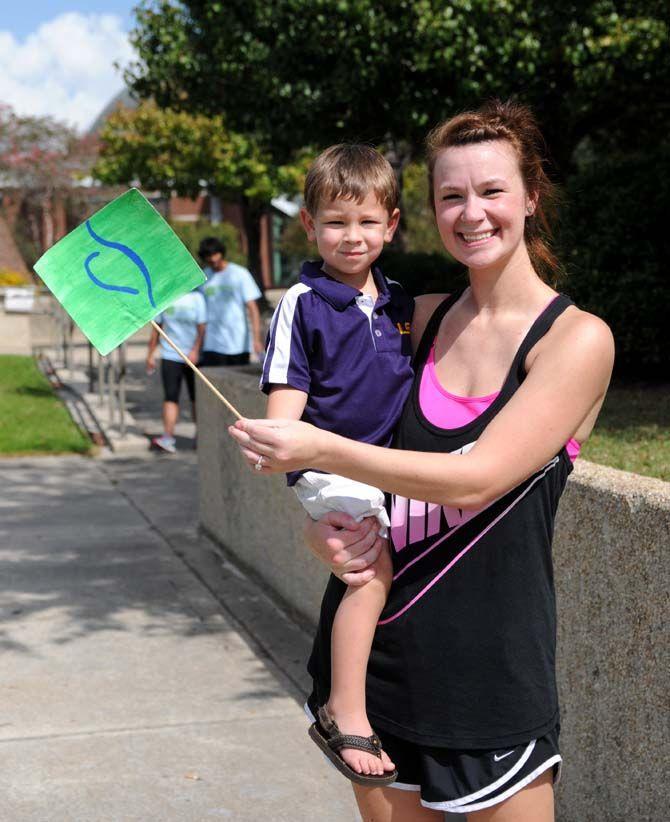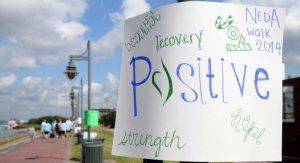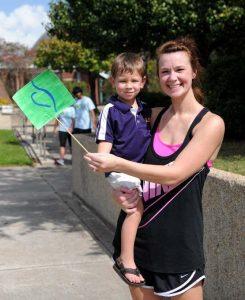For nutrition sophomore Anna McKay, recovering from her eating disorder means choosing not to count calories, going out with friends without worrying about what she eats, only exercising for fun and stopping body bashing.
On Saturday, McKay participated in Baton Rouge’s first National Eating Disorder Association Walk — just a few months after she made the decision to start her recovery after years of suffering from anorexia nervosa.
NEDA is an organization offering support to the estimated 30 million individuals suffering from eating disorders across the country. The organization aims to raise awareness about eating disorders, serving as a catalyst for prevention and access to treatment.
Lead walk coordinator Dani Crockett said she did her first NEDA Walk one year ago in Austin, Texas. Seven months went into planning the Baton Rouge event.
Crockett said the event surpassed its original fundraising goal of $5,000, raising more than $10,000.
Participants walked along the Baton Rouge levee near the historic U.S.S. Kidd. Their path was lined with signs depicting facts about eating disorders and motivational phrases against body bashing.
This Friday will mark the 11th anniversary of Crockett entering treatment for her eating disorder at Our Lady of the Lake Medical Center in Baton Rouge. Crockett shared some of her own history struggling with anorexia nervosa to walk participants.
“I want to end my eating disorder story right here,” Crockett said. “I can’t think of a better 180-degrees story than to say that I helped to host the very first event for this disease in the same city that it almost took my life in.”
She said the eating disorder treatment center closed after she finished her treatment, leaving the River Oaks Hospital’s treatment center in New Orleans as the state’s only inpatient treatment center.
The River Oaks center has room for 16 inpatients to receive treatment, said Marian McGavran, the treatment program director at River Oaks.
McGavran, who worked in family therapy prior to River Oaks, said much of eating disorders have to do with family interactions.
“It’s not about the food. The food is the vehicle,” McGavran said. “The eating disorder is just the solution to a pre-existing problem with a lot of negative consequences.”
During her sophomore year of high school, McKay slipped into her eating disorder after trying to get in shape and eat better. She worked out for hours a day, sometimes running until her vision went black.
“I wasn’t eating enough to fuel my body,” McKay said. “Then I told my parents, ‘I don’t think I’m being healthy anymore.’”
She felt cold, rarely went out with friends and had trouble staying awake in class. After talking with her parents, McKay started to get treatment, but she continued to struggle with eating and couldn’t do physical activities for a while because of the damage anorexia nervosa did to her heart muscles.
“Freshman year of college, I got to my lowest weight. My parents threatened to put me in inpatient,” McKay said. “I wanted to get better for my parents. They spent all their savings on nutritionists and therapists. It’s not cheap, and insurance does not typically cover it.”
Recovery isn’t a quick process, McKay said. For some people it can take years, or their entire lives, and they may never completely recover.
Crockett said eating disorders are called the “silent killer” because those suffering from them say nothing, those who recover from them want to move on and everyone else wants to avoid them.
“So then we have three groups of people and no one’s talking, and the behavior is not changing,” Crockett said. “An eating disorder places a war between your physical body and your mind, and that is a very loud and dangerous war.”
Many people who suffer from eating disorders are perfectionists, Crockett said, but perfection is unattainable because as soon as a goal is reached, a new one is set.
“Eating disorders are, for now, incurable. They are a psychological disorder,” Crockett said. “We have to be able to provide awareness. It will only kill you if you give it the power to do so. Do not be the silent person — we have to stop that at all costs.”
After graduation, McKay wants to work in an eating disorder clinic. When she heard about the NEDA Walk, she got together a team of supporters from the University.
McKay said she didn’t go through sorority rush her first year at the University because she was too sick.
“I woke up one day, and I was like, ‘I can do this.’” McKay said. “I’m still not fully recovered, but I’m there. I’m getting there. It’s a process.”
McKay said she is now making up for time she lost to her eating disorder, and as her health improves, she and her parents celebrate her milestones together.
“I missed out on so much of my life, so many good things,” McKay said. “I say yes to everything. I want to completely live life right now, and I don’t want to miss anything.”
NEDA walk raises eating disorder awareness in Baton Rouge
October 12, 2014
The National Eating Disorder Association (NEDA) hosts its first walk in Louisiana on October 11, 2014 at the Riverfront Plaza.
























